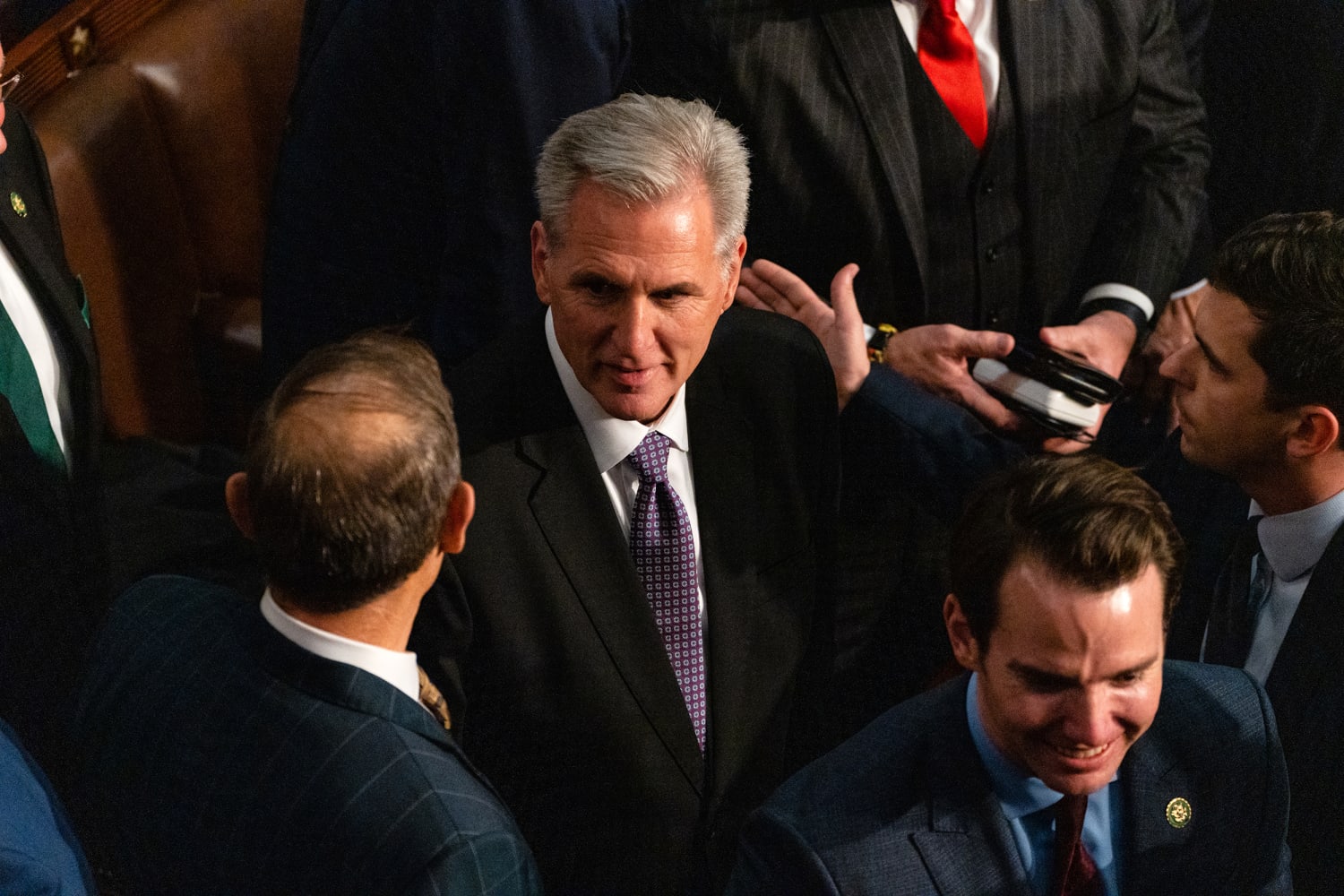WASHINGTON — Many House Republicans are furious with a band of far-right rebels who they say are holding the party hostage by repeatedly rejecting its nominee for speaker.
But there’s one thing they’re so far unwilling to do: work with a faction of Democrats to elect a centrist speaker to govern the narrow GOP majority and teach the rabble-rousers a lesson.
“That’s really off the table,” said Rep. Tom Cole, R-Okla., who has built a reputation as an institutionalist over the years. “I don’t think anybody voted to do that. I don’t think that works very well in any time. I think it’s particularly unsuited to these times. The polarization is too great.”
Cole said that for all the House GOP divisions, “there’s no question” that most members in the caucus are closer in policy and vision to the anti-McCarthy rebels than they are to centrist Democrats.
Rep. Dusty Johnson, R-S.D., who calls himself a “pragmatic conservative,” also dismissed the idea as a fantasy. “Anybody who’s imagining some sort of unity or fusion approach, I think, is probably paying more attention to Aaron Sorkin movies than they are to how this place normally functions,” he said.
The unwillingness of most House Republicans to cut a deal with Democrats to pick a speaker weakens their leverage in the showdown with a group of 20 right-wing lawmakers who want to defeat Rep. Kevin McCarthy, R-Calif., who is backed by 90% of the GOP caucus. It also serves as a preview of how the moderates may operate in stalemates over must-pass bills over the next two years, like funding the government and averting debt default, which far-right members are already threatening unless the measures are attached to ambitious conservative priorities.
The GOP divisions have led to six failed ballots for speaker — the first time in a century a House majority has required multiple attempts to elect a speaker. They risk further damage to the Republican Party’s image after an underwhelming performance in the 2022 midterm elections that led to their current wafer-thin majority.
It’s a precarious situation for the moderate members, who are more likely to represent swing districts and could suffer the most from a tarnished party image. By contrast, the far-right Republicans mostly hail from safe red districts and face little threat of losing their seats to Democrats in a general election.
McCarthy and his deputies continued to negotiate with the right-wing forces Wednesday to address their demands, which include making it easier to overthrow a speaker and promises involving votes on legislation, committee assignments and more. Much of the caucus sees the demands as unreasonable and irresponsible, and McCarthy himself has accused those lawmakers of acting selfishly and not in the best interest of the country.
The talks failed to produce a breakthrough Wednesday, and the House voted 216-214 to adjourn until noon Thursday.
Rep. Don Bacon of Nebraska, who represents a district President Joe Biden carried in 2020, is a rare Republican who has publicly floated the idea of working with Democrats on a consensus pick, but he acknowledged there aren’t serious negotiations at this time.
“If they’re not going to work with us, then we’ll push this down the court more,” he said of the far-right lawmakers. “There will be folks on the other side of the aisle that will make a deal with us when it comes to working on committees and things like that. But we don’t want to go down this path too far. This is about Kevin McCarthy right now, giving them every opportunity.”
As Bacon and other McCarthy allies dangle the possibility of a bipartisan speaker to secure the votes to make him speaker, the anti-McCarthy faction is calling their bluff.
Rep. Bob Good, R-Va., who has voted against McCarthy all six times, said he doesn’t believe any Republicans would go around the House Freedom Caucus and team up with Democrats to pick a speaker. If they did, he said, they should lose their next Republican primaries.
Democrats open door to consensus speaker
Some Democrats say they’re open to negotiating a consensus speaker. Progressive Rep. Ro Khanna, D-Calif., and others say they want conditions, among them that a speaker candidate vow not to allow the debt limit to be used as a weapon to force policy concessions.
Without a speaker, the House can’t conduct any business, raising the stakes for members of both parties who want to govern or launch investigations with each day the impasse continues.
“We have big items facing the country — everything from the debt ceiling to Ukraine to — obviously, we’re going to have to run the government,” said Rep. Josh Gottheimer, D-N.J., the Democratic co-chair of the bipartisan Problem Solvers Caucus. “Right now, it’s on their plate. This is on their side to figure out their housekeeping. They have to pick a speaker. But we all have a responsibility to run the country.”
Gottheimer said the divided government presents opportunities for the parties to work together on domestic manufacturing, semiconductor production, immigration reform, mental health and support for police. “Will the House be set up to govern and run the country?” he said. “If their extremists win and are empowered, that makes governing more difficult for the country.”
But Gottheimer’s Republican co-chair in the Problem Solvers Caucus, Rep. Brian Fitzpatrick of Pennsylvania, is instead helping McCarthy negotiate with Freedom Caucus holdouts, saying the discussions have been “more productive” in small groups.
Some of McCarthy’s opponents insist they won’t back down, expressing a high tolerance for chaos and willingness to keep dealing defeat after defeat to their party’s leadership.
Rep. Matt Gaetz, R-Fla., said he’ll keep blocking McCarthy from the speakership “until the cherry blossoms fall off the trees” — which typically occurs in April.
Frustration with Gaetz and his faction ran high Wednesday.
“This group has now managed to kind of snatch defeat from the jaws of victory. And in the victory was this Republican majority,” Rep. Michael Waltz, R-Fla., told reporters. “There is negotiation, and then there’s holding the rest of us hostage. And 20 don’t get to do that to 201.”
But Waltz didn’t present a solution to tame the rebels, saying, “I’m going to vote for Kevin McCarthy as long as he’s on the ballot.”
Source: | This article originally belongs to Nbcnews.com










